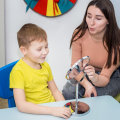Use simple sounds like “da” and “ma” or “ba” and “aa” or “ooh” for babies, even when they are newborns. These vowels and consonants have a great response from children. These simple speech therapy activities help your child talk. As they grow older, they listen to you and try to imitate you.
Speak slowly so that the baby can understand. Try to use simple words and friendly tones. Your toddler can understand what you're saying if you talk to him face to face. Make eye contact and speak slowly and patiently.
If the child repeats the words in the wrong way, just repeat them gently in the right way, so that you can understand the difference. The television DOES NOT help children talk. Do not turn on the television as soon as you get home or keep it on constantly when your toddler is in the room. Contrary to what you might think, television is not considered part of speech therapy activities.
Contact with people is crucial in the language development process. The Best Toys to Help Your Child's Speech Development Nothing works better than using a toy to help your child's speech development. If you ask any speech therapist, they will recommend that the best method is to play with your child and, when they come to play, toys will be a useful tool to help and train the baby's speech and language skills. Speech therapists can help detect and correct early developmental delays.
For children, early intervention and therapy can resolve inadequate speech patterns, improve reading, spelling and writing, and help them keep up with their peers. Early intervention and speech therapy activity are important so that young children don't lag behind in developing oral language and learning vital communication skills. Many SLPs work in schools and with children with autism in clinical settings. Learning to pay attention to what others are saying.
The location of speech therapy for young children depends largely on what services are offered in your area and who pays. Chronic diseases, brain disorders, and hearing problems can cause a young child to have a delay in speech or language development. But trust me when I tell you that your speech therapist will do everything possible to make the transition to therapy easy for you and your child. Rather, YOU will be assigned specific tasks to practice during the week, and the speech therapy session is the time when the therapist can model the techniques and give you some advice.
You received a referral for a speech evaluation, your initial evaluation was performed, funding for the speech therapy service has been approved, and your appointment has been scheduled. Speech/language therapy involves working with children who have difficulty formulating sentences or have a reduced vocabulary. As you return for additional sessions, your child will become more familiar with the therapist and center and will feel more comfortable. The therapist will try to make your child feel comfortable and probably won't be too demanding in the first session.
Some children only need a few months of therapy or regular visits with the therapist, while some children with special needs may benefit from ongoing treatment. By the time your first speech therapy session is scheduled, you will, thankfully, have overcome many of the obstacles in the administrative process. They will also help you learn to use proven speech therapy techniques to teach those skills during an activity that your 2-year-old child likes. Young children may develop language or speech disorders due to illness, hearing problems, or brain disorders.
Some clinics ask parents to wait in the waiting room while the therapist cares for the young child alone, while others ask parents to return to the treatment room. The best types of toys to stimulate children's speech and language development are those that allow your child to move and play with them manually.







